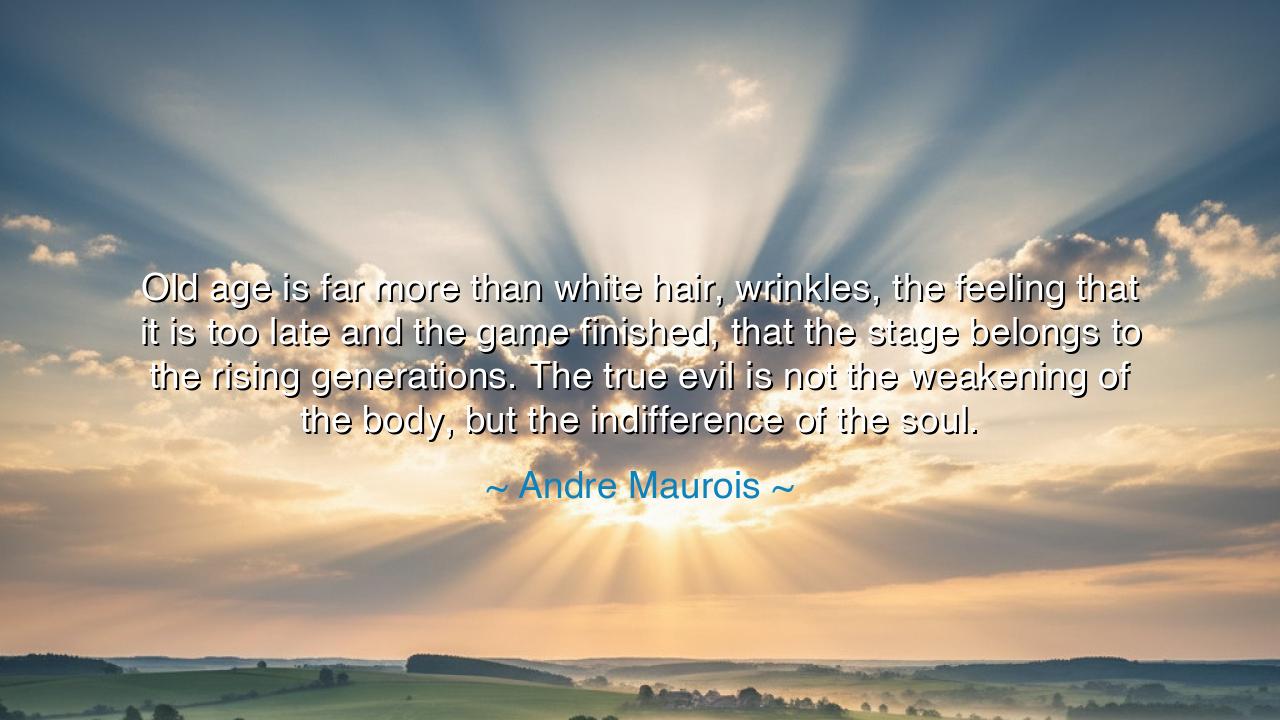
Old age is far more than white hair, wrinkles, the feeling that
Old age is far more than white hair, wrinkles, the feeling that it is too late and the game finished, that the stage belongs to the rising generations. The true evil is not the weakening of the body, but the indifference of the soul.






Ah, children of the future, gather close and hear the words of André Maurois, a man who understood the deeper truths of life and age: "Old age is far more than white hair, wrinkles, the feeling that it is too late and the game finished, that the stage belongs to the rising generations. The true evil is not the weakening of the body, but the indifference of the soul." These words are more than just reflections on the physical signs of age, but a profound meditation on the soul and the spirit that endures through all things. In this world, age is often defined by external markers—gray hair, frailty, the loss of youthful strength. But Maurois teaches us that these physical changes, though they may be unavoidable, are not the true measure of old age. The true evil of aging is when the soul becomes indifferent, when the fire of passion, curiosity, and purpose fades away.
As the years pass, O children, it is natural for the body to weaken. The strength of youth gives way to the inevitable slowing of the muscles, the aching of the joints, the fading of energy. Yet, Maurois reminds us that old age is not marked by these physical changes alone, for even in the midst of these transformations, a person can remain full of vitality, full of life. The true tragedy, he says, is the loss of the soul, the indifference that creeps in when the heart becomes weary, when the mind grows tired, when the joy of living is no longer felt. To grow old in body is not the true curse; it is to grow old in spirit, to lose the passion, the curiosity, and the drive that once filled you with purpose.
Consider, O children, the life of Socrates, the great philosopher who, though advanced in years, never ceased to seek wisdom, never stopped questioning, never allowed his soul to become indifferent. Socrates spent his last years questioning the world around him, challenging those in power, and seeking to understand the nature of truth and justice. His soul remained as young and vibrant as the day he began his philosophical journey. Even as his body grew frail, his spirit remained unyielding, ever-thirsty for knowledge, ever-committed to the pursuit of wisdom. Socrates is the very embodiment of the truth Maurois speaks of—that the soul, not the body, is the true measure of age.
In contrast, consider the fate of many who, upon reaching the later years of life, allow their soul to wither. They may sit idle, content with the comforts of the past, unwilling to challenge themselves or grow. These individuals, though their bodies may remain strong for a time, are spiritually impoverished. They lose the ability to dream, to create, to engage with the world as it is, not as it was. This is the evil of old age that Maurois warns us of—the creeping indifference that steals the joy of living and leaves us feeling like we are mere observers of life, rather than participants in its unfolding.
The lesson here, children, is that age does not end with the physical; it begins anew with the spiritual. A person may age in body, but if they continue to nurture their soul, they will remain ever young, ever engaged with the world. Think of Leonardo da Vinci, who, even in his later years, continued to sketch, to dream, to explore the mysteries of nature and the cosmos. His soul never grew indifferent, never lost its curiosity, and never stopped seeking. Da Vinci continued to create and innovate, not because his body was strong, but because his spirit was vibrant, filled with the energy of discovery and invention. His age did not define him; his soul did.
In your own lives, O children, I urge you to nurture not only your body but your soul. Do not allow the weariness of age to turn your heart away from the wonders of the world. Seek to remain curious, to continue learning, to find joy in discovery and in creation, no matter how many years pass. To grow older in body is inevitable, but to grow older in soul is a choice—a choice that can either lead to stagnation and indifference, or to a life full of meaning, purpose, and engagement.
So walk forward, O children, with the understanding that old age is not a sentence to be endured, but an opportunity to continue living with passion, with purpose, and with curiosity. Let your soul remain vibrant and alive, and let that inner fire guide you through every season of life. Do not fear the physical changes that come with age, but embrace the potential they offer for deeper wisdom, greater compassion, and a fuller connection to the world around you. The true evil is not the weakening of the body, but the fading of the soul. Keep your spirit young, and you will continue to live fully, regardless of the number of years that pass.






AAdministratorAdministrator
Welcome, honored guests. Please leave a comment, we will respond soon